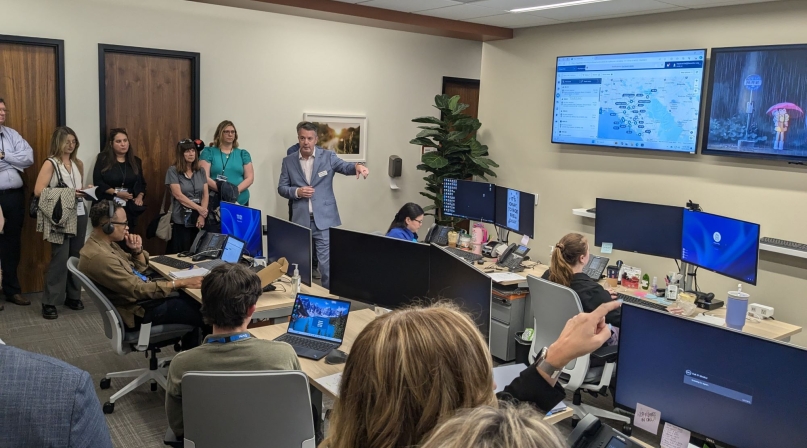Data sharing boosts results, saves money in Orange County, Calif.

Key Takeaways
In response to a growing number of high-needs residents cycling through health care and justice systems, Orange County, Calif. implemented a data-sharing platform and care coordination program that has since reduced costs and improved outcomes for residents throughout the county.
The effective cross-sector data sharing and coordinated programming led to Orange County being chosen as one of four peer learning sites for NACo’s Familiar Faces Initiative (FFI) in 2017. The FFI is a national peer-learning network that supports counties in enhancing their system of care for individuals who frequently cycle through jails, homeless shelters, emergency departments and other local crisis services (referred to as “familiar faces”).
The FFI helps counties identify these individuals, understand their needs and challenges and coordinate services across agencies and sectors to improve outcomes and reduce costs.
Learn more
According to Lilly Simmering, the county's deputy executive officer, “data integration was an issue that originated between the justice and public safety department and the health and human services department” in Orange County, Calif. She notes that data sharing platforms existed at the federal and state level but had not made it to the local level.
“The effort to increase data sharing started under the counties willingness to make changes and the Orange County Criminal Justice Coordinating Committee’s (OCCJCC) directive to start a mission to revamp our correctional system through a program called OC Cares,” Simmering said.
The OC Cares Initiative has a variety of funding sources but is recognized by Michelle Aguirre, Orange County’s chief financial officer, for its focus on collaboration and partnerships. Aguirre stated that the County “pursues a variety of funding sources, but the most important thing is that we do it together, working with all county departments, the court and the presiding judge, community-based organizations and the individuals impacted by our systems of care.”
Successful collaboration and coordination is highlighted by Simmering as she discusses the regulatory and legal framework that allows departments to share sensitive information.
“The key for success [in] Orange County was the California State Legislature passing AB210, which is a piece of legislation that LA County championed – spending over two years working on the framework and then another six-to-eight months pushing it through legislation,” Simmering said.
Although the County began building their technology system in 2019, Simmering explains that care coordination and case management of familiar faces could not begin until 2021. The passage of AB210 and the leadership by the county’s Board of Supervisors were critical factors in allowing county staff to design, develop and implement the System of Care Data Integration System (SOCDIS).
Simmering stated that today, SOCDIS is at the heart of the county’s care coordination for vulnerable populations. It allows for all county departments and facilities to share and integrate critical data points and ensure that everyone involved in the care of high-needs individuals has access to this comprehensive data. The county’s Chief Probation Officer explained that the coalition and its partners adopted the attitude that, “re-entry begins at entry” and that this culture shift is what made data-sharing platforms and care coordination programs in Orange County possible.
Aguirre addressed the members of the Familiar Faces Peer Exchange with a lasting sentiment, emphasizing that “here in Orange County, it is about the people. We talk about the data, but bottom line, it is about the people and always doing the right thing for the people.” As a peer-learning site, Orange County serves as a model for other counties seeking innovative strategies to support their communities and underscores the importance of county leadership and staff in driving the initiatives forward.
County News
Data sharing can keep ‘familiar faces’ from facing jail’s revolving door

Related News

Sonoma County creates solutions to homeless crisis
Wildfire devastation and the COVID-19 pandemic contributed to a homelessness crisis in Sonoma County, Calif., prompting the county to create more comprehensive housing offerings to better meet the needs of its most vulnerable populations.

HRSA Releases Final Reentry Care Guidelines Following NACo Input
On November 29, the Health Resources and Services Administration (HRSA) released their final Policy Information Notice (PIN) with policy guidance for health centers who support transitions in care for justice-involved individuals reentering their communities.

House Transportation and Infrastructure Committee advances, House passes key bill with NACo’s support
On September 18, the U.S. House of Representatives Committee on Transportation and Infrastructure held a full committee markup session, voting to advance 29 measures for House floor consideration.
